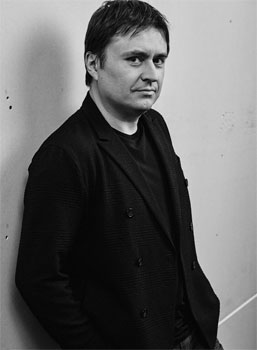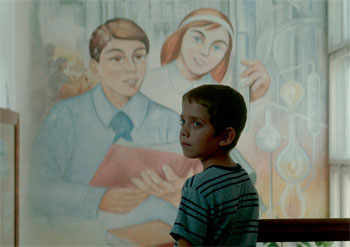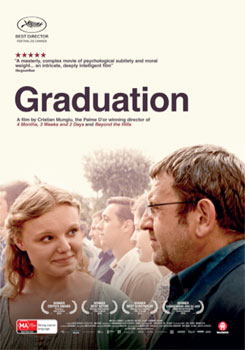Cristian Mungiu Graduation

Cristian Mungiu Graduation
Cast: Adrian Titieni, Maria-Victoria Dragus, Lia Bugnar
Director: Cristian Mungiu
Genre: Crime, Drama
Rated: MA
Running Time: 128 minutes
Synopsis: Romeo Aldea (49), a physician living in a small mountain town in Transylvania, has raised his daughter Eliza with the idea that once she turns 18, she will leave to study and live abroad. His plan is close to succeeding – Eliza has got a scholarship to study psychology in UK. She just has to pass her final exams – a formality for such a good student.
On the day prior to her first written exam, an incident jeopardizes Eliza's departure. Now Romeo has to make a decision. There are ways of solving the problem, but none of them using the principles he, as a father, has taught his daughter.
Graduation
Release Date: June 8th, 2017
Director's Note
Who is Romeo Aldea?
Approaching 50, for Romeo Aldea, would be tough enough without his having made a few compromises. That was just how it was. Maybe it was how your parents raised you and what everybody was doing around you. Perhaps it was what you picked up from what the teachers told you; that this is all your mind, your soul, your heart was capable of.
 And once you made the first compromise, the second and the third came more easily – you slowly made peace with the idea that compromise is part of life and that, after all, there are different kinds of lies, different kinds of compromise and all kinds of situations. Well, had the world been straight and fair, you would have been straight and fair as well – if everybody around you had respected the truth and the law, you would have done the same. But unfortunately life is not like that, and you don't want to be a sucker, a fool, a loser and so on. In life, you have to be flexible, to navigate murky situations, to decide in each case what is right and what isn't, how far you can compromise, what actions are acceptable to you and where the boundaries lie.
And once you made the first compromise, the second and the third came more easily – you slowly made peace with the idea that compromise is part of life and that, after all, there are different kinds of lies, different kinds of compromise and all kinds of situations. Well, had the world been straight and fair, you would have been straight and fair as well – if everybody around you had respected the truth and the law, you would have done the same. But unfortunately life is not like that, and you don't want to be a sucker, a fool, a loser and so on. In life, you have to be flexible, to navigate murky situations, to decide in each case what is right and what isn't, how far you can compromise, what actions are acceptable to you and where the boundaries lie.
One day, you become a parent.
That's when the self-questioning starts. What should you tell your kids? What do you prepare them for? Do you guide them on the path that you have taken, or do you encourage them to be principled no matter what, since their journey is just beginning and they don't yet owe anything to anybody? Naturally, as a parent, you want the best for them. But what is the best for them? And which world are you preparing them for – the one you grew up in, or the one abroad? For the real world, or for an ideal one? What should you teach them: to fight with all their might for their own comfort, or to respect others and fight for their values as well? Does the end justify the means?
The patterns of thought and behaviour that are generalized become the norm – they set the ethical boundaries of a society, including those societies in which everybody complains about corruption. Of course, we're talking about other people's corruption, not our own. We don't see ourselves, we are beyond reproach. You complain of being fed up of living surrounded by lies, you describe the cheating and wrongdoing as unbearable, you don't expose these acts or oppose them. What can one individual do against a whole world that is set up this way and functions like that? Can one person change it on his own? No. Could one at least try? When the question comes up, it's already too hard, too late. Could one's children do it, perhaps? They might be able to try, but should parents wish that kind of life for their children? Don't we want our children to be happy and comfortable, and hope that somebody else will come along and set the world straight, with all the sacrifices that such an endeavour entails? Why should my child be the one to be sacrificed?
 About levels of meaning
About levels of meaningGraduation is primarily an x-ray of the moment when you realize that most of your life is already behind you. You have made the important decisions of your life and here you are today. Often, life at this age doesn't look quite as you imagined when you were young. But this is it, there's nothing much you can change now. Still, there is something you feel you can do. Something that would give meaning to all the misfortunes you experienced: save your children, teach them well, help them make better choices than you did. Yet it is not so easy to decide what is best to tell your children.
Graduation is a story about compromise and principles, about decisions and choices, about individualism and solidarity, and also about education and family and about aging. It is the story of a parent who is wondering what is best for his child, whether his child should get by in the real world or should struggle always to be honest and change the world as much as she can. Romeo Aldea is at a moment in his life when he can feel the earth moving under his feet. He is not young any more, but he is not yet old. His marriage has been falling apart, his mother is old and sick, his daughter is ready to embark on her own journey. He is wondering how the world will look after his daughter leaves home, and how the next five, ten, twenty years of his life will look.
What is he going to do next? He doesn't have any answers – he is just experiencing great anxiety and the pressure to continue the everyday struggle of daily routine and survival. But is he still truly living? And what can he do to warn his child, to guide his daughter so she won't end up in the same dead-end as him when she's his age? The story of Romeo Aldea is also a story about a society and its institutions. Is there a relationship between compromise, corruption, education and poverty? Can we educate our children much differently to how we've been educated?
The essence of storytelling for such a film does not reside in it clarifying all its themes or meanings, but in managing not to limit them too much. The language is always abstract, the communication is always imprecise, details sometimes convey as much content as the overall story. The specificity of cinema lies precisely in those details that can only be perceived when watching the film: a non-translatable attitude, an uncertain feeling, an opaque state of mind – things that cannot be put into words.
What kind of cinema?
Graduation belongs to that kind of cinema that values reality and realism. Of course, it is not reality, it just uses everyday life events captured in real time, with no editing, to reorganize moments that could have belonged to reality; to a more organized and structured reality than real life.
The story respects the chronology of events but it remains subjective, limited to the protagonist's perspective. Nevertheless, it aims to make you understand what he feels and what he wonders about – but only by observing him from a distance.
What matters is the truth of every moment. The director's own views about the moral questions the story raises, the actor's interpretation, the style of the shooting – nothing should distract you from watching the flow of events and reaching your own conclusions about the story, the characters, and the values and beliefs that are questioned.
Should the film manage to make you reflect on your own choices in life, your moments of untruthfulness or your past decisions - that would be a wonderful bonus.
We make films to tell stories, to ask questions, to deepen our investigation of the world around us. But there are many stories out there. As a filmmaker, you need to ask yourself: why did you choose this particular story?
Graduation
Release Date: June 8th, 2017
MORE





